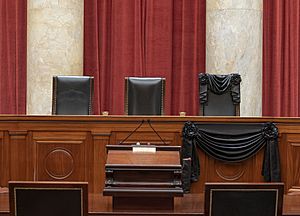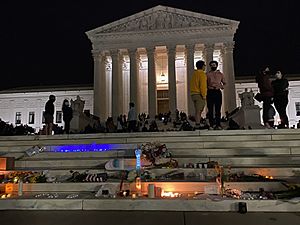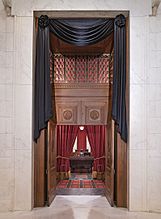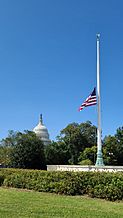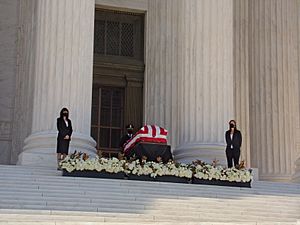Death and state funeral of Ruth Bader Ginsburg facts for kids
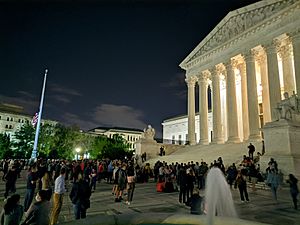
Ruth Bader Ginsburg, a very important judge on the Supreme Court of the United States, passed away on September 18, 2020. She was 87 years old. Her death was due to complications from pancreatic cancer that had spread. Many people were very sad and paid attention right away. That same evening, people gathered outside the Supreme Court building in Washington, D.C. to remember her. Memorials and gatherings also took place in other U.S. cities like Chicago, New York City, and San Francisco.
Ginsburg was the first woman to have her casket displayed at the Supreme Court Building for two days, from September 23 to 24. This was longer than usual. On September 25, her casket was moved to the Capitol. She became the first woman and first Jewish person to receive this special honor. A private burial service was held at Arlington National Cemetery on September 29.
Contents
Her Health and Passing
Justice Ginsburg had faced health challenges before. She had colon cancer in the past, which was gone by 1999. She also had pancreatic cancer in 2009. In 2018, doctors found tumors in her lungs. She also had more health issues in 2019 and 2020, including a gallbladder problem and an infection. She passed away from complications of pancreatic cancer at her home in Washington, D.C., on September 18, 2020. She was 87. Days before she died, she shared a special wish with her granddaughter. She said she hoped her replacement on the Supreme Court would not be chosen until a new president was in office.
Remembering Her: Vigils and Tributes
Within hours of the news, hundreds of people gathered in front of the Supreme Court in Washington, D.C. They sang songs like "Amazing Grace" and "America the Beautiful". People also held gatherings in many other cities across the country. Online, many shared their memories and tributes. By the next morning, a temporary memorial had been set up on the steps of the court.
On September 19, about 2,500 people attended another vigil at the Supreme Court. Vigils were also held in cities like Chicago, Portland, Maine, Minneapolis, and San Francisco. In New York City, an image of Ginsburg was projected onto the New York State Supreme Court Building. It read "thank you" and "rest in power". White collars, like the ones Ginsburg wore, were placed on statues in New York City. One famous statue was the Fearless Girl near the New York Stock Exchange Building.
Special Honors and Memorials
Following a long tradition, the Supreme Court courtroom doors, Ginsburg's seat, and the bench in front of her seat were draped in black. On September 18, the Speaker of the House of Representatives, Nancy Pelosi, ordered flags at the U.S. Capitol to be flown at half-staff. This was to honor Ginsburg. President Trump also ordered all U.S. flags at federal buildings to be at half-staff until her burial.
Many people suggested naming places or putting up statues to honor Ginsburg. The Mayor of New York City, Bill de Blasio, announced that a building in Brooklyn, where Ginsburg was born, would be renamed for her. The Governor of New York, Andrew Cuomo, said a statue of Ginsburg would be placed in Brooklyn.
Landmarks across New York state were lit up in blue to honor Ginsburg. These included the One World Trade Center and Niagara Falls. In Minnesota, the mayors of Minneapolis and Saint Paul declared September 21 "Ruth Bader Ginsburg Day". On September 25, the Empire State Building in New York City was lit with red, white, and blue.
Reactions to Her Passing
In the United States
Many legal figures praised Ginsburg. Chief Justice John Roberts called her a "jurist of historic stature." He said the Supreme Court lost a dear colleague. He believed future generations would remember her as a "tireless champion of justice." Some noted that according to Jewish tradition, dying on Rosh Hashanah means a person is very righteous.
President Trump and presidential candidate Joe Biden were campaigning when the news broke. Trump said she "was an amazing woman who led an amazing life." Biden called her death "very sad news." He also said that a new judge should not be chosen until after the election. The White House praised Ginsburg, saying her decisions on equality inspired many.
Speaker Pelosi said Ginsburg's death was "an incalculable loss for our democracy." Governor Cuomo described her as someone who "gave voice to the voiceless." Hillary Clinton said, "There will never be another like her." Former President Bill Clinton, who appointed Ginsburg to the Supreme Court, also shared his admiration. Many celebrities and politicians, including Mindy Kaling and Bernie Sanders, also shared their condolences.
President Trump later questioned if Ginsburg's last wish about her replacement was truly hers. However, a reporter who first shared the wish confirmed it came from Ginsburg herself. She stated there were other witnesses present.
Around the World
Leaders from other countries also honored Ginsburg. Ursula von der Leyen, President of the European Commission, called Ginsburg a "pioneer for women's right." Justin Trudeau, Prime Minister of Canada, said her impact would be felt for generations. Emmanuel Macron, President of France, wrote that she fought for justice and equality. Emily Haber, the German Ambassador to the United States, said Germany looked to Ginsburg as a "pioneer for women." Pedro Sánchez, Prime Minister of Spain, sent his condolences.
Funeral Services
At the Supreme Court Building
Ginsburg's casket was displayed at the Supreme Court Building on September 23 and 24. This was a special honor, as previous ceremonies for other judges were usually only one day. Ginsburg was the first woman to have her casket displayed at the Supreme Court.
Her funeral ceremony began on September 23. Her casket arrived at the Supreme Court. Over a hundred of her former law clerks lined the steps. Eight officers carried her casket into the building. It was placed on a special stand called a catafalque, which was used for Abraham Lincoln's funeral. A rabbi led the ceremony with prayers and songs. She called Ginsburg "an American hero." Chief Justice Roberts also spoke, describing Ginsburg as a "rock star" and a "tireless champion of justice." All eight other Supreme Court justices were there.
Later, Ginsburg's casket was brought outside. Hundreds of people waited in line to pay their respects. Some had traveled from far away. Many public figures also visited, including Vice President Mike Pence and former President Bill Clinton with Hillary Clinton. Many lawmakers from both parties also paid their respects.
The next day, Ginsburg's casket was again placed at the top of the Supreme Court steps. President Trump and First Lady Melania Trump visited. A crowd gathered and some people booed and shouted at President Trump. They chanted "Vote him out!" and "Honor her wish," referring to Ginsburg's last request.
At the Capitol Building
Ginsburg's casket was then moved to the United States Capitol on September 25. She was the first Jewish person and the first woman to be honored in this way. Only one other Supreme Court justice, William Howard Taft, had been honored like this before. Also, only one other woman, Rosa Parks, had been honored at the Capitol, but as a private citizen.
A military honor guard carried her casket up the Capitol steps. The honor guard was led by Shaye Lynne Haver, one of the first women to graduate from the US Army Ranger School. Speaker Pelosi opened the ceremony with a speech. A famous opera singer, Denyce Graves, sang two songs. The rabbi who spoke at the Supreme Court also gave another speech. The ceremony ended with lawmakers paying their respects. A US Army veteran and Ginsburg's physical trainer, Bryant Johnson, later did three push-ups in front of the casket.
At Arlington National Cemetery
On September 29, a private funeral service was held at Arlington National Cemetery. Ginsburg was buried next to her husband, Martin D. Ginsburg. The ceremony was led by Rabbi Lauren Holtzblatt. Only family, close friends, justices, and Ginsburg's staff were there. The ceremony ended with opera music. Her grave is in Section 5, where nine other justices are also buried.
Images for kids


